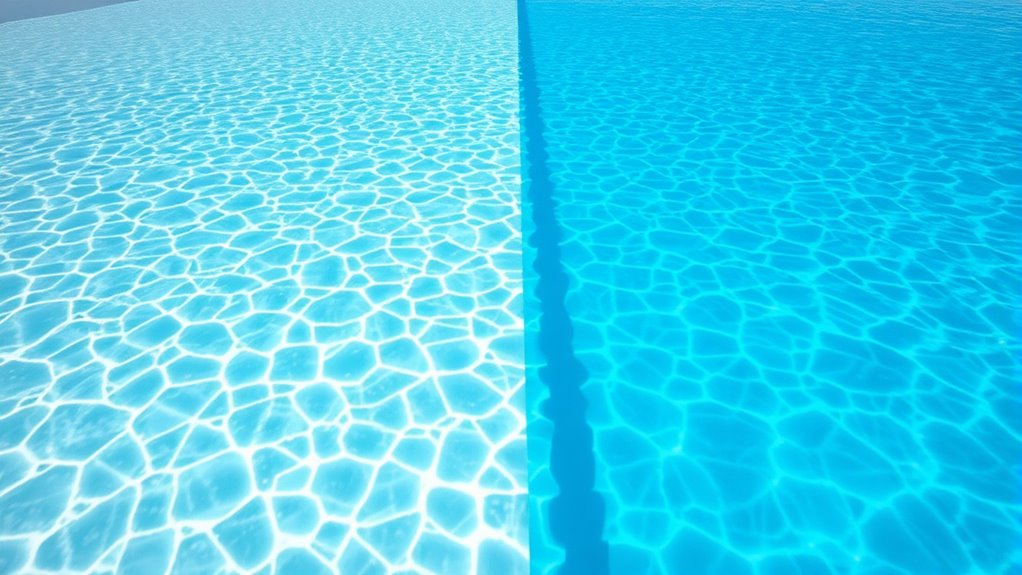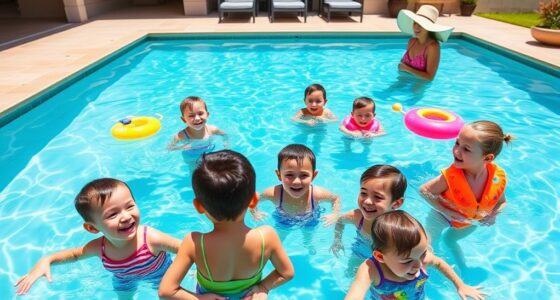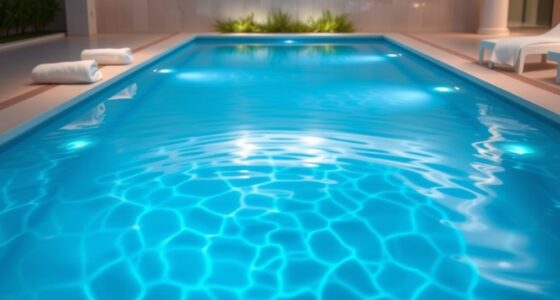Choosing between saltwater and chlorine for your Endless Pool depends on your preferences for comfort, maintenance, and long-term costs. Saltwater pools offer softer water, less skin and eye irritation, and lower chemical handling, but may have higher initial setup costs. Chlorine pools provide strong disinfection and usually lower upfront expenses but can cause dryness and irritation. To find out which suits your lifestyle and budget best, consider the benefits and trade-offs explained in detail.
Key Takeaways
- Saltwater pools offer softer water and less skin and eye irritation compared to chlorine pools.
- Chlorine pools provide stronger, rapid disinfection and are typically less expensive upfront.
- Saltwater systems have higher initial costs but lower ongoing chemical expenses and maintenance.
- Saltwater pools tend to be more comfortable for swimmers, with reduced dryness and irritation.
- The choice depends on budget, maintenance preferences, and desired swim comfort and water quality.
Understanding the Basics of Water Sanitation Systems
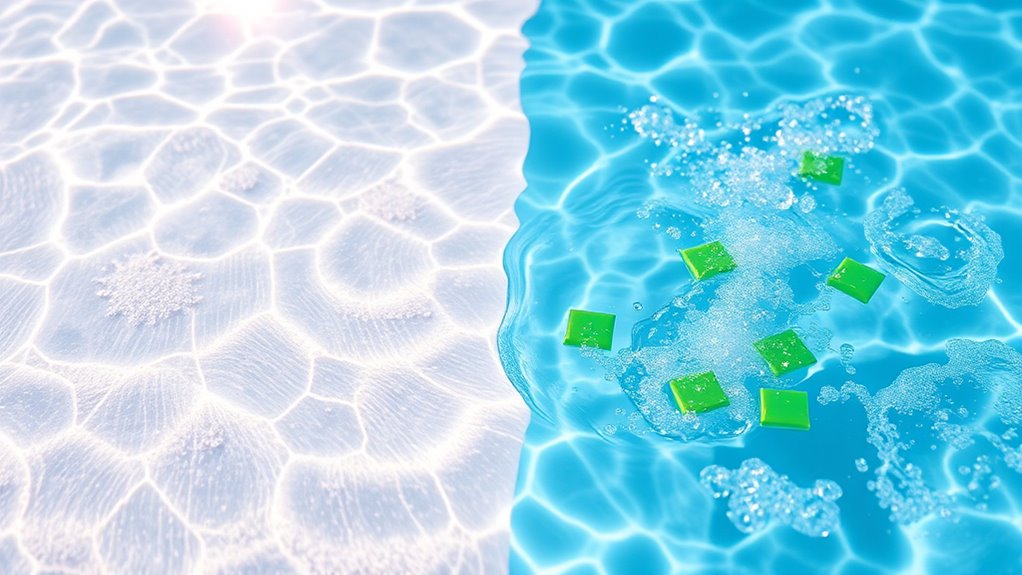
Understanding how water sanitation systems work is essential before choosing between saltwater and chlorine pools. These systems keep your pool clean and safe by controlling bacteria, algae, and other contaminants. Chlorine pools use added chlorine, which disinfects the water through chemical reactions. You typically add chlorine manually or through automatic feeders, maintaining a consistent level for sanitation. Saltwater systems, on the other hand, generate chlorine on-site by converting salt into chlorine via a process called electrolysis. This produces a steady, low level of chlorine, reducing the need for frequent chemical additions. Both systems aim to maintain a healthy balance of disinfectants. Knowing how each method functions helps you understand their differences and choose the system that best suits your needs and preferences. Additionally, Mazda Tuning techniques can be applied to optimize the performance and maintenance of your pool equipment, ensuring longevity and efficiency.
The Advantages of Saltwater Systems
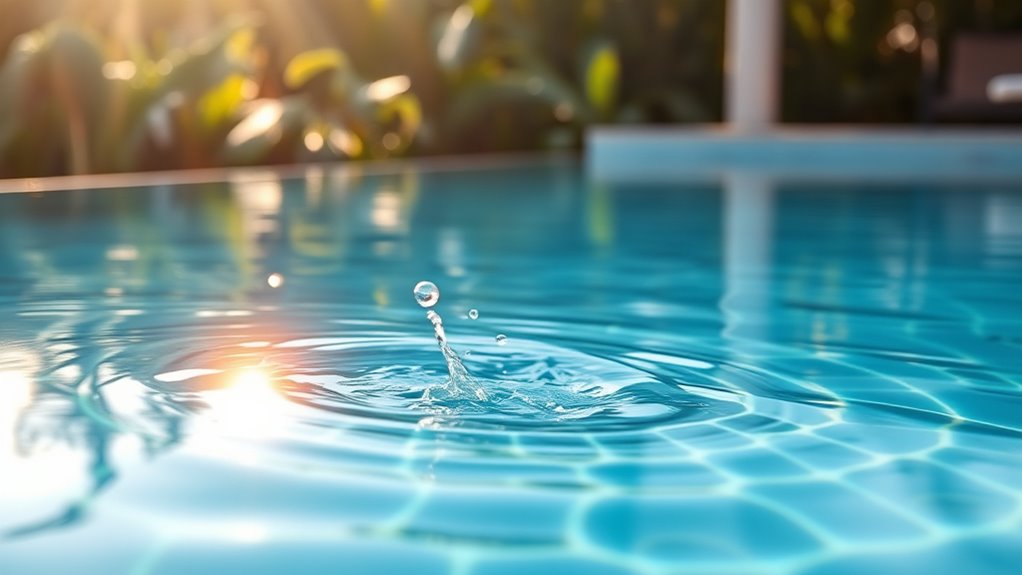
Saltwater systems offer several benefits that make them an attractive choice for pool owners. First, they typically produce softer, silkier water, which feels more comfortable on your skin and eyes. Second, saltwater pools require less frequent chemical adjustments, saving you time and effort. Third, the natural sanitizing process reduces harsh chemical smells and irritation. Fourth, maintaining a saltwater system can be more cost-effective over time since you mainly need to replenish salt rather than constantly buying chlorine. Additionally, home pool maintenance tends to be simpler with saltwater systems, making them a convenient option for busy households. Overall, saltwater pools create a gentler, more enjoyable swimming experience while simplifying maintenance. These advantages make saltwater systems a popular option for those seeking convenience and comfort in their endless pools.
The Benefits of Chlorine-Based Systems
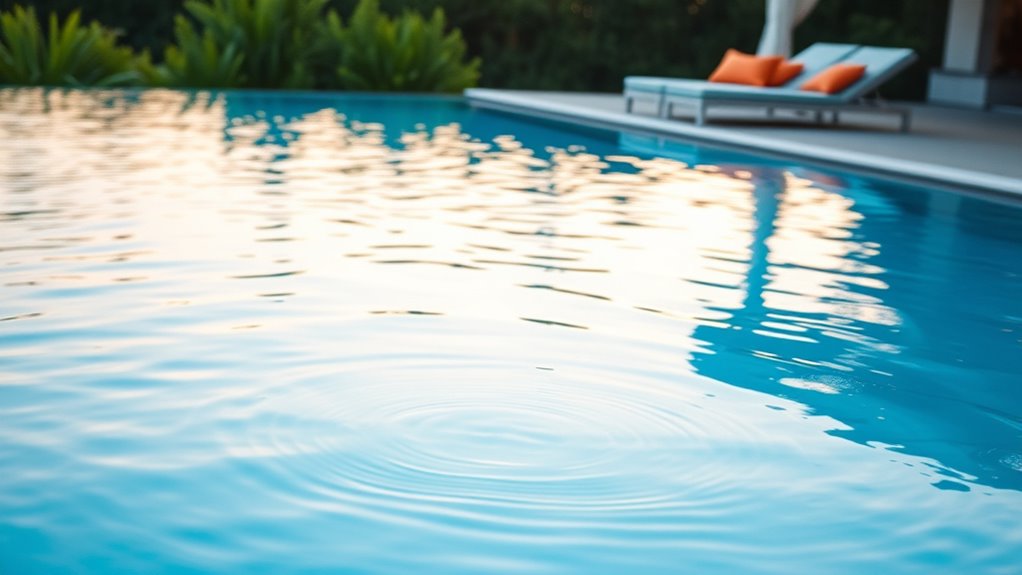
Chlorine-based systems offer strong disinfection power that keeps your pool safe and clear. They’re also cost-effective to maintain, with supplies that are easy to find and replace. This makes chlorine a reliable choice for consistent, hassle-free pool care.
Effective Disinfection Power
Have you ever wondered why chlorine remains the preferred method for disinfecting pools? Its proven ability to eliminate bacteria, viruses, and algae is unmatched. Chlorine’s strong oxidative properties break down organic contaminants quickly, keeping your pool safe. Here’s what makes it effective:
- Rapidly kills germs on contact, ensuring immediate sanitation.
- Maintains a residual level, continuously disinfecting as you swim.
- Works effectively in various water conditions and temperatures.
- Has a well-established track record for safety and reliability.
- Its effectiveness is supported by extensive research on contrast ratio and image quality, ensuring reliable and consistent disinfection performance.
This consistent, powerful disinfection capability gives you peace of mind, knowing your pool remains hygienic with minimal effort. Chlorine’s proven effectiveness makes it a trusted choice for endless pool owners seeking reliable sanitation.
Cost-Effective Maintenance
Because it’s widely available and simple to use, chlorine systems often cost less to maintain over time. You don’t need special equipment or extensive training to keep your pool clean. Chlorine tablets and liquid chlorine are affordable and easy to find at most stores. Maintenance mainly involves regular testing and adding chlorine as needed, which keeps costs predictable. Here’s a quick comparison:
| Aspect | Chlorine System | Saltwater System |
|---|---|---|
| Initial Setup Cost | Lower (basic chlorination equipment) | Higher (salt generator installation) |
| Ongoing Maintenance | Cheaper (regular chlorine refills) | More expensive (electricity + salt) |
| Supplies | Readily available (tablets, liquid) | Less accessible, specialized products |
| Ease of Use | Simple and straightforward | Requires understanding salt levels |
Chlorine systems are a cost-effective choice with straightforward upkeep. Additionally, chlorine’s effectiveness in sanitizing pools is well-established, making it a reliable disinfectant for pool maintenance.
Widely Available Supplies
One of the main advantages of chlorine systems is the widespread availability of supplies needed to keep your pool clean. Chlorine products are easy to find at most pool supply stores and online, making maintenance straightforward. You won’t have to worry about sourcing specialized equipment or rare chemicals. Tracking tanning progress is simple with these supplies, as they allow for quick adjustments to water quality. Here are some common supplies you’ll need:
- Chlorine tablets or granules
- Test strips or a digital tester
- pH balancing chemicals
- Shock treatment products
These supplies are affordable and accessible, so you can quickly address any water quality issues. Plus, their availability means you won’t experience delays in maintaining your pool’s cleanliness, ensuring consistent, hassle-free operation.
Comparing Maintenance and Operating Costs

When comparing maintenance and operating costs, you’ll notice differences in chemical expenses, with saltwater systems often requiring fewer chemicals. Equipment durability also varies, affecting long-term repair costs, while energy consumption levels can influence your monthly bills. Understanding these factors helps you choose the most cost-effective option for your pool, especially considering the long-term affordability provided by the platform’s features.
Chemical Expense Differences
Saltwater pools typically have lower ongoing chemical expenses compared to chlorine pools, primarily because the salt system continuously produces chlorine, reducing the need for frequent chemical purchases. You’ll save on buying chlorine tablets or liquid chemicals regularly. Instead, your main costs involve maintaining the salt levels and occasional chemical adjustments. Here’s what impacts your expenses:
- Salt costs—a one-time purchase or periodic topping-off.
- Salt cell maintenance—cleaning to ensure efficiency.
- pH balancing chemicals—needed for both systems.
- Shock treatments—used occasionally to keep water clear.
Over time, these costs tend to be less than the ongoing purchase of chlorine, making saltwater pools more economical for long-term maintenance.
Equipment Durability Factors
While saltwater systems reduce ongoing chemical costs, their equipment’s durability directly impacts long-term maintenance expenses. Saltwater generators and corrosion-resistant components tend to be more sensitive to water quality and require regular inspections. Over time, salt buildup can corrode metal parts if not properly maintained, leading to costly repairs or replacements. Your choice affects overall costs: saltwater setups might have higher initial investment and potential repair costs, while chlorine systems tend to be more straightforward but might incur ongoing chemical expenses. Evaluating equipment longevity helps you better predict long-term maintenance needs and costs. Additionally, corrosion resistance plays a crucial role in determining how well pool components withstand harsh water conditions over time.
Energy Consumption Levels
Energy consumption plays a significant role in the overall cost of maintaining your pool system. Saltwater pools typically use less energy than chlorine pools, but this varies based on equipment efficiency. To understand the differences, consider these factors:
- Saltwater generators require less frequent chemical adjustments, reducing energy for testing and balancing.
- Chlorine systems often need more frequent pump runs to maintain water clarity.
- Saltwater pools may have higher initial costs but lower ongoing energy expenses.
- Chlorine pools might consume more power due to additional sanitization equipment.
- Regional climate and water conditions can influence divorce statistics and impact pool maintenance needs, indirectly affecting energy use.
Impact on Skin, Eyes, and Swim Comfort

When swimming in saltwater pools, many people notice that their skin feels less irritated and their eyes remain clearer compared to chlorinated pools. Saltwater’s gentler nature reduces dryness and redness, making your swim more comfortable. Chlorine, however, can cause dryness, itching, and eye irritation over time. To help visualize, consider this table:
| Effect | Saltwater Pool | Chlorinated Pool |
|---|---|---|
| Skin Feel | Softer, less dry | Dry, irritated |
| Eyes Comfort | Clear, less red | Red, itchy |
| Overall Comfort | More pleasant, smooth | Often uncomfortable |
Saltwater pools generally provide a more pleasant, irritation-free experience, making your swim more enjoyable and skin-friendly.
Environmental Considerations and Safety
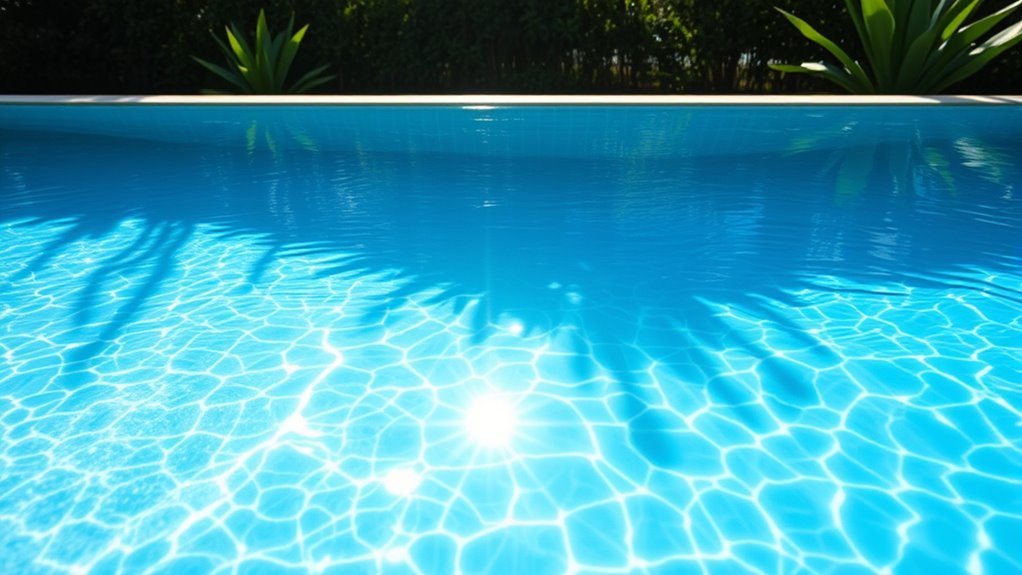
Saltwater pools are often considered more environmentally friendly because they generate chlorine naturally through a salt chlorination system, reducing the need for chemical additives. This process lowers the chemical footprint and minimizes the risk of runoff or pollution. Additionally, saltwater systems typically require fewer chemical purchases and less frequent maintenance.
Saltwater pools reduce chemical use and environmental impact through natural chlorine generation.
Here’s what you should keep in mind:
- Chemical Use: Saltwater pools produce chlorine on-site, decreasing the need for added chemicals.
- Environmental Impact: Reduced chemical runoff benefits local ecosystems and water quality.
- Safety Concerns: Salt levels are generally safe, but overexposure can cause irritation or corrosion.
- Energy Consumption: Salt chlorination systems may use more energy, impacting overall environmental considerations.
Making the Right Choice for Your Pool and Lifestyle
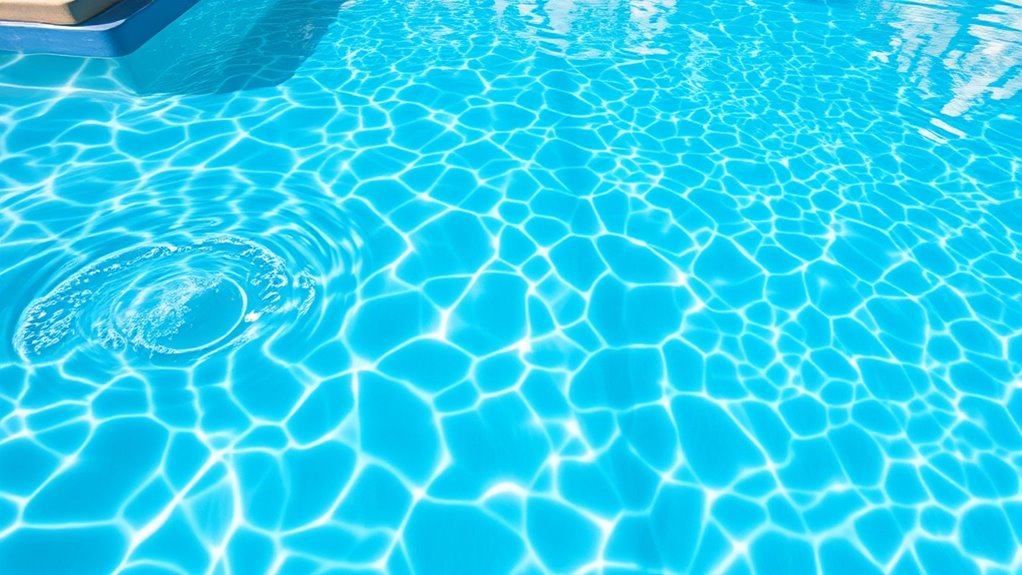
Choosing between saltwater and chlorine pools ultimately depends on your lifestyle, budget, and personal preferences. If you want a low-maintenance option that offers softer water, a saltwater pool might suit you better. It requires fewer chemical adjustments and tends to be gentler on your skin and eyes. On the other hand, if you prefer a more straightforward, potentially lower upfront cost, traditional chlorine pools could be the way to go. Consider how much time you want to dedicate to pool upkeep, your sensitivity to chemicals, and your long-term expenses. Your daily routine and comfort should guide your decision. Ultimately, selecting the right system means aligning it with how you plan to use your pool and what feels best for your lifestyle. Additionally, modern pool maintenance options can simplify chemical management and enhance your swimming experience.
Frequently Asked Questions
How Long Does It Take to Convert From Chlorine to Saltwater?
It typically takes about 24 to 48 hours to convert your pool from chlorine to saltwater. During this time, you’ll need to drain and clean the pool, then install the salt chlorine generator and add the appropriate amount of salt. You should run your pump continuously and test the water regularly to guarantee proper salt levels and pH balance. Once everything is set, your pool will be ready to enjoy saltwater swimming.
Are Saltwater Systems Suitable for All Pool Sizes and Shapes?
Saltwater systems generally suit most pool sizes and shapes, but you should consider your pool’s specific dimensions and plumbing setup. Larger pools may require more robust systems, which can be pricier and more complex to install. For irregular shapes, you might need custom solutions or adjustments to guarantee proper salt distribution. Consulting a professional helps determine if a saltwater system fits your pool’s design and size, ensuring ideal performance and longevity.
Can Saltwater Systems Cause Corrosion to Pool Equipment?
Sure, saltwater systems can cause corrosion, but don’t worry—your pool equipment’s just playing hard to get. The salty environment can slowly eat away at metal parts like heaters and pumps if you don’t maintain them properly. Regular inspections, using corrosion-resistant materials, and adding a sacrificial anode can keep your equipment happy and your pool sparkling, proving that a little salt doesn’t have to sink your setup.
What Are the Potential Health Risks Associated With Each System?
You might experience skin or eye irritation with either system, especially if chlorine levels aren’t properly maintained. Saltwater pools can sometimes cause respiratory issues due to chloramines, while traditional chlorine pools may release harsh fumes. Both systems can lead to allergic reactions or asthma flare-ups in sensitive individuals. To minimize health risks, regularly test and adjust chemical levels and make sure good ventilation around your pool area.
How Do Salt and Chlorine Affect Pool Water Temperature Regulation?
Salt and chlorine can influence your pool’s temperature regulation more than you might think. Saltwater pools tend to retain heat better because salt enhances the water’s thermal capacity, meaning it heats up and cools down more slowly. Chlorine pools, on the other hand, may require more frequent heating adjustments due to chemical reactions that can slightly lower water temperature. So, it’s a balancing act—sometimes, you gotta roll with the punches.
Conclusion
Choosing between saltwater and chlorine depends on your lifestyle and preferences. Both options keep your pool clean, but each has its pros and cons. Remember, “You get what you pay for,” so weigh the costs, maintenance, and comfort factors carefully. Ultimately, pick the system that fits your routine and makes swimming enjoyable. Whichever you choose, regular upkeep will ensure your endless pool stays invigorating and safe for years to come.

